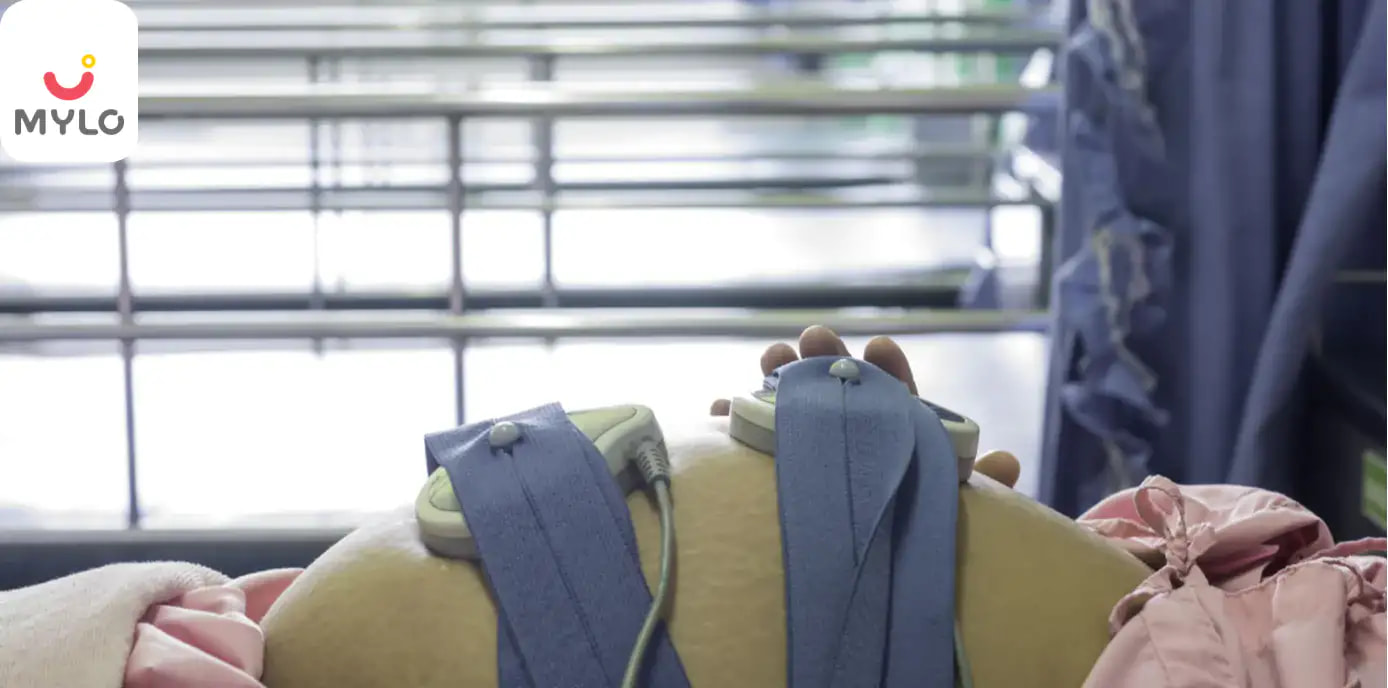Home

Post Term Pregnancy: Symptoms, Causes, Complications, Risks, Management & Treatment
In this Article

Pregnancy
Post Term Pregnancy: Symptoms, Causes, Complications, Risks, Management & Treatment
Updated on 3 November 2023
Find out all about post-term pregnancy, its causes, symptoms, complications and associated risks.
Introduction
The average pregnancy duration is estimated to be 9 months. Medical professionals are responsible for providing the expectant mothers with a due date considering the last menstrual cycle and other conception details in the first ultrasound examination of a mother-to-be. The Estimated Delivery Date (EDD) is calculated to be 40 weeks/ 280 days from the last menstrual period (LMP) of a woman. It is therefore vital to keep track of your menstrual dates regularly. Irregular periods can contribute to miscalculation of LMP and thereby causing inaccurate calculation of the due date of a pregnant mother.
What is Post-term Pregnancy?
An extension of the gestational period of a woman beyond 42 weeks is called a Post-term Pregnancy. Also known as prolonged pregnancy/ Postdates, this type of condition poses a challenge to health care providers and a source of anxiety for the pregnant woman. This condition is usually diagnosed by doctors through Ultrasound examination, measuring the size of the uterus, monitoring the growth of the fetus, and watching the state of the amniotic fluid inside the womb.
What are the causes of Post-term Pregnancy?
Though the exact cause of why a pregnancy might extend beyond 42 weeks is unknown, there are various factors attributed to a potential post-term gestation.
- The most common of them is the dating of the last menstrual period being inaccurate. This is prevalent in women who suffer irregular periods or miss track of their period dates due to stress or anxiety.
- Previous Post Term Pregnancies, that is, when a mother has had a similar pregnancy before could also be a reason for the condition.
- Genetic factors like when the pregnant mother, herself, was a baby of post-term pregnancy; her twin sibling being a mother who went through such a pregnancy can be attributed to longer pregnancies.
- Primiparity where a woman is giving birth for the first time has been an influence in post-term pregnancies.
- Studies have revealed that abnormal BMI is an important yet modifiable factor in extended gestation. An obese woman has a higher chance of going through a post-term pregnancy, while a woman with a low BMI has the chance of having a preterm pregnancy. Conscious dietary changes and a healthy lifestyle can bring positive changes during pregnancy.
- Post-term pregnancies are sometimes indicative of a male fetus.
Post-Term Pregnancy Signs and Symptoms
The symptoms of a post-term pregnancy are almost none. It is usually known after the diagnosis. But there are some impacts that a post-term baby has while inside the womb.
- Dry skin could be caused due to the baby being in the womb for a prolonged period.
- Long nails and excess hair growth can be witnessed
- The baby might look abnormally thin with long hands and legs. This is attributed to the improper functioning of the placenta (Uteroplacental Insufficiency).
- Meconium stains can make the baby’s hands and nails look yellow or green.
What are the risks involved in a Post Term Pregnancy?
Post Term Pregnancy risks in the newborn can be critical. Some of them include
1. Neonatal Mortality
The odds of stillbirths after the said period of gestation are high. Though relatively small, the cases of newborn morbidity should be considered in labor.
2. Foetal Dysmaturity
Post maturity is a condition where the growth of the baby is restricted after a certain time because of inadequate nourishment inside the uterus. These babies tend to have distinctive appearances.
3. Body Size variation:
Some babies are born with larger body sizes (a condition called Macrosomia) where the weight of the infant could be over 5000 grams. This may cause threats to the mother in labor as well as birth injury in the infant.
4. Hypoglycemia
This condition is characterized by low levels of sugar in the blood. Neonatal hypoglycemia is caused due to the exhaustion of sugar supply in the blood of the baby.
5. Inhalation of Meconium
Meconium is the first stool that the baby passes from its body. In Post-term labor, there is a possibility of this substance getting released into the amniotic fluids and the baby could breathe it, causing fatal effects.
What are the Post-Term Pregnancy Complications in the Mother?
The condition is as strenuous for the mother as it is for the fetus. Longer labor is a typical struggle associated with this type of pregnancy. Since the fetal size could be bigger, there are risks of Cephalopelvic disproportion (where the baby finds it difficult to come through the vaginal path either because the baby’s head is larger or the mother’s pelvis is smaller) and shoulder dystocia (where the shoulder of the fetus gets stuck in the birth canal). In similar cases, the doctors may use a vacuum or forceps to aid the birthing process. Sometimes, in more serious cases, the health care providers may opt for a cesarean delivery to save the lives of both the mother and the baby. Other Complications include Infection or wound in the organs surrounding the uterus and vagina and loss of blood.
Post Term Pregnancy Management and Treatment:
Ultrasound examination from the early weeks of pregnancy is the best form of managing a post-term pregnancy. It can reduce considerable risks involved in labor and neonatal care. Once the mother is diagnosed with a post-term, a few tests are recommended to ensure that the mom and the baby are safe.
A Biophysical profile (a test done in pregnancy) is done to monitor the fetal movements, frequency of fetal heartbeat also known as Nonstress testing, and the volume of Amniotic fluid in the uterus. Sometimes the level of amniotic fluid may go down resulting in a condition called Oligohydramnios. Any abnormal variation in the mentioned tests could cause fetal stress.
In such cases, the care providers will make attempts to induce labor. With mothers having unfavorable cervix during labor, post-term pregnancy treatment involves employing methods like membrane sweeping, injecting oxytocin via drips, and giving prostaglandin to ripen the cervix. These can make the dilation happen faster and aid in reducing post-term delivery complications.
Summary
- Post-term Pregnancy is when the gestational age of a mother extends beyond 42 weeks.
- Several factors like a miscalculation of LMP, genetic factors, obesity, and hormonal reasons influence the possibilities of a post-term.
- The risks of post-term pregnancies can be seen in both the mother and the fetus.
- Frequent Ultrasound examinations and continuous fetal monitoring are required to manage the complications.
- Inducing labor after the due date can help in minimizing the post term pregnancy risks.
References
- Galal M, Symonds I, Murray H, Petraglia F, Smith R. (2012). Postterm pregnancy. www.ncbi.nlm.nih.gov
- Prajapati, S. Chavda, D. (2017). Retrospective study of post term pregnancy and its outcome.www.ijrcog.org



Written by
Priyanka Verma
Priyanka is an experienced editor & content writer with great attention to detail. Mother to an 11-year-old, she's a ski
Read MoreGet baby's diet chart, and growth tips

Related Articles
Related Questions
Hello frnds..still no pain...doctor said head fix nhi hua hai..bt vagina me pain hai aur back pain bhi... anyone having same issues??

Kon kon c chije aisi hai jo pregnancy mei gas acidity jalan karti hain... Koi btayega plz bcz mujhe aksar khane ke baad hi samagh aata hai ki is chij se gas acidity jalan ho gyi hai. Please share your knowledge

I am 13 week pregnancy. Anyone having Storione-xt tablet. It better to have morning or night ???

Hlo to be moms....i hv a query...in my 9.5 wk i feel body joint pain like in ankle, knee, wrist, shoulder, toes....pain intensity is high...i cnt sleep....what should i do pls help....cn i cosult my doc.

Influenza and boostrix injection kisiko laga hai kya 8 month pregnancy me and q lagta hai ye plz reply me

Related Topics
RECENTLY PUBLISHED ARTICLES
our most recent articles

Diet & Nutrition
গর্ভাবস্থায় আলুবোখরা: উপকারিতা ও ঝুঁকি | Prunes During Pregnancy: Benefits & Risks in Bengali

Diet & Nutrition
গর্ভাবস্থায় হিং | ঝুঁকি, সুবিধা এবং অন্যান্য চিকিৎসা | Hing During Pregnancy | Risks, Benefits & Other Treatments in Bengali

Women Specific Issues
স্তনের উপর সাদা দাগ: লক্ষণ, কারণ এবং চিকিৎসা | White Spots on Nipple: Causes, Symptoms, and Treatments in Bengali

Diet & Nutrition
গর্ভাবস্থায় পোহা: উপকারিতা, ধরণ এবং রেসিপি | Poha During Pregnancy: Benefits, Types & Recipes in Bengali

Diet & Nutrition
গর্ভাবস্থায় মাছ: উপকারিতা এবং ঝুঁকি | Fish In Pregnancy: Benefits and Risks in Bengali

Diet & Nutrition
গর্ভাবস্থায় রেড ওয়াইন: পার্শ্ব প্রতিক্রিয়া এবং নির্দেশিকা | Red Wine During Pregnancy: Side Effects & Guidelines in Bengali
- ইনার থাই চ্যাফিং: কারণ, উপসর্গ এবং চিকিৎসা | Inner Thigh Chafing: Causes, Symptoms & Treatment in Bengali
- গর্ভাবস্থায় ব্রাউন রাইস: উপকারিতা ও সতর্কতা | Brown Rice During Pregnancy: Benefits & Precautions in Bengali
- Velamentous Cord Insertion - Precautions, Results & Safety
- Unlock the Secret to Flawless Skin: 7 Must-Have Qualities in a Face Serum
- Unlock the Secret to Radiant Skin: How Vitamin C Serum Can Transform Your Complexion
- Gender No Bar: 10 Reasons Why Everyone Needs a Body Lotion
- Unlock the Secret to Radiant Skin How to Choose the Perfect Body Lotion for Your Skin Type
- Top 10 Reasons to Apply a Body Lotion After Every Bath
- Communication in Toddlers: Milestones & Activities
- How to Improve Vocabulary for Toddlers?
- A Comprehensive Guide to Understanding Placenta Accreta
- Vulvovaginitis in Toddlers Causes, Symptoms and Treatment
- A Comprehensive Guide to Understanding Cerebral Palsy in Children
- Bitter Taste in Mouth During Pregnancy: Understanding the Causes and Remedies


AWARDS AND RECOGNITION

Mylo wins Forbes D2C Disruptor award

Mylo wins The Economic Times Promising Brands 2022
AS SEEN IN

- Mylo Care: Effective and science-backed personal care and wellness solutions for a joyful you.
- Mylo Baby: Science-backed, gentle and effective personal care & hygiene range for your little one.
- Mylo Community: Trusted and empathetic community of 10mn+ parents and experts.
Product Categories
baby carrier | baby soap | baby wipes | stretch marks cream | baby cream | baby shampoo | baby massage oil | baby hair oil | stretch marks oil | baby body wash | baby powder | baby lotion | diaper rash cream | newborn diapers | teether | baby kajal | baby diapers | cloth diapers |








